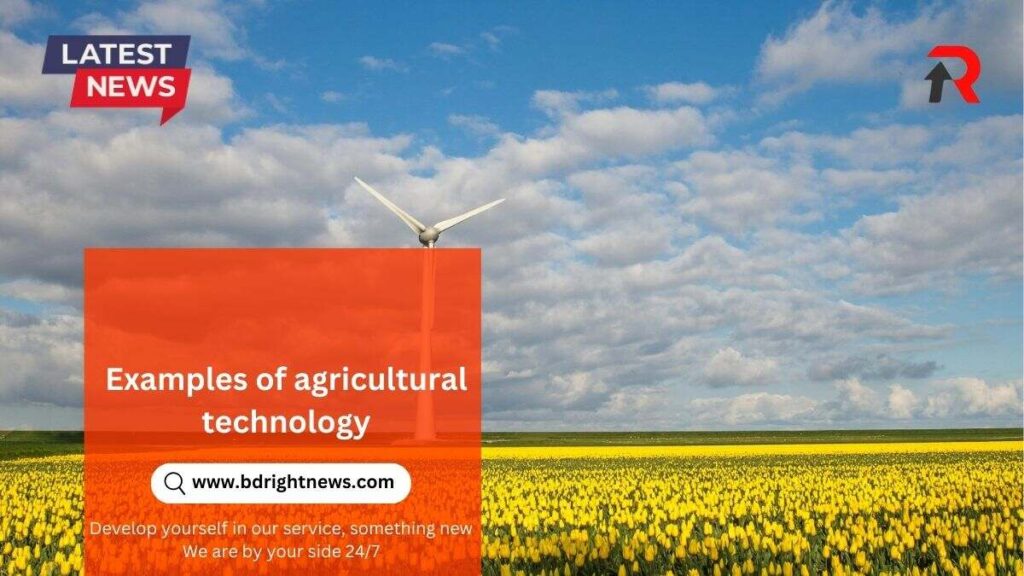Examples of Agricultural Technology
Examples of agricultural technology:
Agricultural technology has evolved significantly over the centuries, but in recent decades, the pace of change has accelerated due to innovations in science, engineering, and data management. The development of new technologies has had a profound impact on global food production, making farming more efficient, sustainable, and responsive to the challenges posed by climate change, population growth, and dwindling natural resources. In this article, we will explore a range of agricultural technologies that are shaping modern farming practices.
- Precision examples of agricultural technology
Precision agriculture is one of the most important advancements in modern farming. It involves the use of technologies like GPS (Global Positioning System), GIS (Geographic Information Systems), and sensors to collect and analyze data related to crop conditions, soil health, and weather patterns. This technology enables farmers to make more informed decisions about planting, watering, fertilizing, and harvesting crops.
Key Technologies in Precision Agriculture:
- GPS and GIS: These systems help farmers map their fields with high accuracy, allowing them to monitor soil variability, identify problem areas, and optimize planting patterns.
- Sensors and Drones: Sensors can be placed in the soil to measure moisture levels, temperature, and nutrient content. Drones equipped with cameras and sensors can be used to survey fields from the air, providing detailed images and data that help farmers monitor crop health and detect pests or diseases early.
- Variable Rate Technology (VRT): VRT allows farmers to apply inputs like water, fertilizers, and pesticides at varying rates across a field, optimizing the use of resources and reducing waste.
2. Examples of agricultural technology; Genetically Modified Organisms (GMOs)
Genetically modified organisms (GMOs) are plants or animals that have had their DNA altered using genetic engineering techniques to exhibit desirable traits. In agriculture, GMOs have been developed to resist pests, tolerate herbicides, and withstand environmental stresses such as drought or poor soil conditions.
Examples of GMO Crops:
- Bt Corn and Bt Cotton: These crops have been genetically engineered to produce a toxin from the bacterium Bacillus thuringiensis (Bt), which is toxic to specific insect pests but safe for humans and other animals.
- Herbicide-Resistant Soybeans: These soybeans have been modified to resist herbicides, allowing farmers to control weeds without damaging their crops.
- Drought-Tolerant Maize: This genetically modified maize is designed to survive in regions with limited water availability, helping to ensure food security in drought-prone areas.
While GMOs have been controversial in some circles due to concerns about their environmental and health impacts, they have also contributed to increased crop yields and reduced the need for chemical pesticides.
- Vertical Farming and Hydroponics
As the global population grows and urbanization increases, there is less land available for traditional farming. This has led to the rise of vertical farming and hydroponics, which allow food to be grown in urban environments and areas where conventional agriculture is not feasible.
Vertical Farming:
Vertical farming involves growing crops in stacked layers, often inside buildings or shipping containers. This method uses controlled environments, including artificial lighting, temperature regulation, and automated watering systems, to optimize plant growth year-round. Vertical farms can be located near urban centers, reducing transportation costs and carbon emissions.
Hydroponics:
Hydroponics is a method of growing plants without soil, using nutrient-rich water solutions instead. Plants are grown in a controlled environment where their roots are submerged in the nutrient solution, providing all the necessary nutrients for growth. Hydroponic systems use significantly less water than traditional farming and can be set up in areas with poor soil quality.
Both vertical farming and hydroponics offer solutions to challenges like limited arable land, water scarcity, and the need for local food production in urban areas.
4. Robotics and Automation
The agricultural industry is increasingly relying on robotics and automation to increase efficiency and reduce labor costs. Robots are being developed to perform tasks that were once labor-intensive, such as planting, harvesting, and even monitoring crop health.
Examples of Agricultural Robots:
- Autonomous Tractors: Self-driving tractors equipped with GPS and sensors can be programmed to plant seeds, apply fertilizers, and harvest crops with minimal human intervention.
- Harvesting Robots: Robots designed to pick fruits and vegetables, such as strawberries and tomatoes, are becoming more common. These robots use cameras and sensors to identify ripe produce and harvest it without damaging the plants.
- Weed-Killing Robots: Autonomous robots can be programmed to detect and remove weeds without the use of herbicides, reducing the environmental impact of farming.
The use of robotics in agriculture is still in its early stages, but it has the potential to revolutionize the industry by reducing labor costs, increasing efficiency, and addressing labor shortages in many parts of the world.
5. Internet of Things (IoT) in Agriculture
The Internet of Things (IoT) refers to a network of interconnected devices that can communicate with each other and collect and exchange data. In agriculture, IoT technology is being used to create “smart farms” where every aspect of production is monitored and optimized using sensors, data analytics, and automation.
IoT Applications in Agriculture:
- Smart Irrigation Systems: These systems use soil moisture sensors and weather data to automatically adjust watering schedules, ensuring crops receive the right amount of water without wasting resources.
- Livestock Monitoring: IoT devices can be attached to livestock to monitor their health, track their movements, and ensure they are receiving adequate food and water. This helps farmers manage large herds more effectively.
- Remote Crop Monitoring: Using IoT sensors placed throughout fields, farmers can remotely monitor soil conditions, temperature, and humidity levels in real-time, allowing them to respond quickly to changes that could affect crop health.
IoT technology is helping farmers become more efficient, reduce waste, and make data-driven decisions that improve crop yields and profitability.
- Examples of agricultural technology; Artificial Intelligence (AI) and Machine Learning
Artificial intelligence (AI) and machine learning are transforming agriculture by enabling farmers to analyze large amounts of data and make smarter decisions about crop management, pest control, and resource allocation.
AI in Agriculture:
- Crop Monitoring and Disease Detection: AI-powered systems can analyze images of crops taken by drones or satellites and identify signs of disease or pest infestations before they become widespread. This allows farmers to take preventative action and reduce crop losses.
- Predictive Analytics: Machine learning algorithms can analyze historical weather data, soil conditions, and crop performance to predict the best planting times, optimize irrigation schedules, and forecast yields.
- Automated Farm Equipment: AI is being integrated into farm machinery to make it more autonomous and efficient. For example, self-driving tractors can be programmed to follow optimal routes through a field, reducing fuel consumption and minimizing soil compaction.
AI has the potential to revolutionize agriculture by improving decision-making, reducing costs, and increasing productivity.
- Blockchain Technology
Blockchain, a decentralized and secure digital ledger, is finding applications in agriculture, particularly in supply chain management and traceability. Blockchain technology can improve transparency, reduce fraud, and increase trust between farmers, suppliers, and consumers.
Applications of Blockchain in Agriculture:
- Supply Chain Transparency: Blockchain can be used to track the journey of agricultural products from farm to table. Consumers can scan a product’s QR code to see where it was grown, how it was processed, and when it was shipped, ensuring food safety and quality.
- Smart Contracts: Blockchain enables the creation of smart contracts, which automatically execute when certain conditions are met. For example, a smart contract could be used to release payment to a farmer once a shipment of produce is delivered and verified, reducing the need for intermediaries.
- Fair Trade and Sustainability Certification: Blockchain can help verify the authenticity of fair trade and sustainability certifications by providing a tamper-proof record of the product’s origin and production practices.
Examples of agricultural technology: Blockchain technology is still in its early stages in agriculture, but it holds promise for improving transparency, reducing fraud, and enhancing the efficiency of global food supply chains.
- Renewable Energy in Agriculture
Renewable energy technologies are playing an increasingly important role in agriculture as farmers seek to reduce their reliance on fossil fuels and lower their carbon footprint. Solar, wind, and bioenergy are being used to power farms, reduce energy costs, and promote sustainability.
Examples of Renewable Energy in Agriculture:
- Solar-Powered Irrigation: Solar panels can be used to power irrigation systems, reducing the need for diesel or electricity from the grid. This is particularly beneficial in remote areas where access to electricity is limited.
- Wind Energy: Wind turbines can generate electricity for farms, reducing energy costs and providing a clean, renewable source of power.
- Bioenergy: Agricultural waste, such as crop residues and animal manure, can be converted into biogas or biofuels, providing a renewable source of energy for heating, cooking, and electricity generation.
The use of renewable energy in agriculture is helping to reduce greenhouse gas emissions, lower energy costs, and promote sustainable farming practices.
- Climate-Resilient Crops and Agroecology
As climate change poses new challenges to agriculture, the development of climate-resilient crops and the adoption of agroecological practices are becoming increasingly important. These technologies and approaches aim to make agriculture more sustainable and adaptable to changing environmental conditions.
Climate-Resilient Crops:
- Drought-Tolerant Varieties: Scientists are developing crops that can thrive in areas with limited water availability, such as drought-resistant maize, wheat, and rice.
- Salt-Tolerant Crops: In coastal regions where soil salinity is a problem, salt-tolerant crops like certain varieties of barley and rice are being cultivated.
- Heat-Tolerant Varieties: As temperatures rise, crops that can withstand higher temperatures are being developed, ensuring food security in regions affected by extreme heat.
Agroecology:
Agroecology is an approach to farming that focuses on working with nature rather
Read More:

